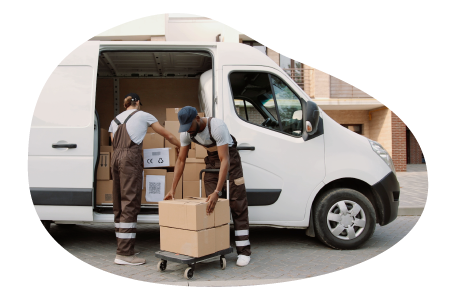
State laws for commercial auto insurance
Because state laws regulate commercial auto insurance, it's important to know the requirements for your business based on where you are located. Learn more about the laws for commercial auto insurance in your state.
Each state sets commercial auto insurance requirements

When you buy a policy, you'll need to make sure it meets your state's minimum coverage requirements for bodily injury liability and property damage liability.
Failing to maintain this coverage can result in steep financial penalties, while also leaving your business at risk of an expensive lawsuit or settlement if an accident is your fault.
Find commercial auto insurance requirements in your state

Why do you need commercial auto insurance?
If your business owns vehicles, a commercial auto insurance policy can offer you the same kind of financial protection that you receive from your personal auto insurance. It’s required in most states, and it makes financial sense for business owners to insure their vehicles.
This is especially true for companies that rely on vehicles for a majority of their business. Delivery drivers and couriers, trucking companies, landscapers, motor carriers, and food trucks should make sure they have commercial auto coverage, as well as non-trucking liability insurance.
A commercial auto policy offers liability protection when you or an employee gets into an accident while driving a company vehicle. It can pay for any property damage or injuries caused by your business vehicle, as well as legal expenses. It can also cover medical expenses for yourself or an employee in a work vehicle accident.
Businesses that move people or goods across state lines are subject to both state and federal auto insurance laws, which mandate coverage based on the vehicle's weight, number of passengers, and type of goods transported.

How much does company car insurance cost?

Commercial auto insurance costs an average of $147 per month. 37% of Insureon small business customers pay less than $100 per month for their policies.
Your cost is based on a number of factors, including:
- Number of vehicles
- Vehicle type and value
- Level of risk involved
- Claims history
- Employee driving records
- Endorsements, like bobtail coverage
How much commercial vehicle insurance is required?
The required types of coverage and the minimum liability limits differ according to the insurance laws in each state. It's a good idea to buy coverage beyond the minimum, as lawsuits can be extremely expensive.
You might also consider collision coverage, which pays for damage to your own vehicle in an accident. Comprehensive coverage goes beyond this, with coverage for theft, weather damage, falling tree limbs, and other hazards.
Another coverage to consider is personal injury protection (PIP) insurance, which is an add-on to your commercial auto policy that helps provide medical payments (MedPay) coverage after a car accident, regardless of who was at fault. State laws determine whether PIP coverage is required.
It’s also worth paying attention to your deductible, any exclusions within your policy, and other options such as towing and vehicle rental after an accident.
What are split limits and combined single limits?
Commercial auto covers both auto liability (if you’re sued for bodily injury or property damage) and physical damage or loss caused by accidents, theft, vandalism, and storms. Most policies have a split limit, which means different limits for bodily injury, property damage liability, and property damage.
Combined single limit (CSL) policies have one limit that is the maximum for both bodily injury and property damage liability combined. CSL policies have a higher premium and are more common for truckers or larger businesses with more assets to protect.
Do I need additional coverage, beyond commercial auto insurance?
If you or your employees use any personal, leased, or rented vehicles for work, you may need hired and non-owned auto insurance (HNOA) because your personal or commercial auto insurance wouldn’t cover any accidents that happen while those vehicles are used for work.
Your personal auto insurance company covers your vehicle use only during personal activities or driving to and from work. Your personal auto insurance policy doesn’t cover any accidents connected directly to your business operation.
Commercial auto insurance covers vehicles that your business owns, but not any vehicles that you rent or lease for work.
Consider what would happen if you or an employee were in an accident while making deliveries in your own car. You’d be on the hook for any damages, medical expenses, or lawsuits that result from the accident.
You can buy HNOA coverage separately, but many businesses obtain this as an add-on to their general liability insurance or their commercial auto insurance, usually at a lower rate than buying the policies separately.
Do I need additional auto insurance coverage if I drive into a different state?
If you, your covered drivers, or business materials cross state lines, your state insurance travels along with you. In many instances, if the insurance limits in the state where the car is registered are less than the state limits where you'll be driving, your insurance carrier will cover the difference to match these limits so that you will meet the other state's legal requirements.
However, some states do have interstate coverage requirements that you must meet in order for your covered drivers or business materials to cross state borders. It is best to try and stay within your coverage zone as outlined by your state laws, or consult an Insureon agent or carrier to help determine the right coverage limits for your business.
